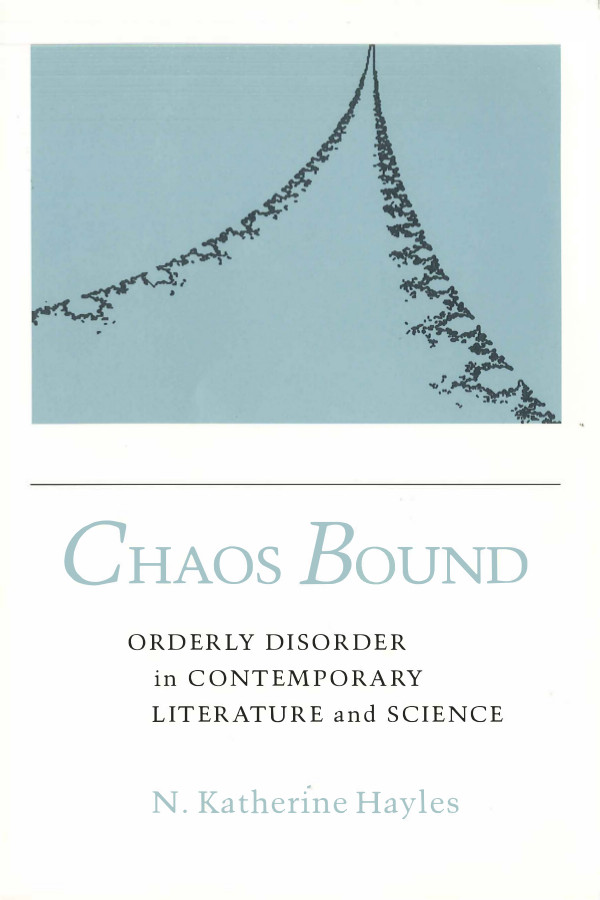Lee Baxandall, Stefan Morawski (eds.): Marx & Engels on Literature and Art: A Selection of Writings (1973)
Filed under book | Tags: · aesthetics, art, art theory, capitalism, literary theory, literature

A concise compilation of texts divided into nine sections with a judicious introductory essay by Morawski.
Translations and selections by Lee Baxandall and Stefan Morawski
Introduction by Stefan Morawski
Publisher Telos Press, St. Louis/MI, 1973
ISBN 0914386026
175 pages
via Charles, in the Unlimited Edition
Review: M. L. Raina (Minnesota Review, 1975)
Marxist aesthetics on Monoskop wiki
PDF (5 MB, updated to an OCR’d version via Marcell Mars)
See also Margaret A. Rose’s Marx’s Lost Aesthetic: Karl Marx and the Visual Arts, 1984.
Comment (0)N. Katherine Hayles: Chaos Bound: Orderly Disorder in Contemporary Literature and Science (1990)
Filed under book | Tags: · chaos theory, entropy, history of literature, information theory, literary theory, literature, nonlinearity, physics, postmodernism, poststructuralism, science, thermodynamics, writing

“At the same time that the study of nonlinear dynamics came into its own in the sciences, the focus of literary studies shifted toward local, fragmentary modes of analysis in which texts were no longer regarded as deterministic or predictable. N. Katherine Hayles here investigates parallels between contemporary literature and critical theory and the emerging interdisciplinary field known as the science of chaos. She finds in both scientific and literary discourse new interpretations of chaos, which is seen no longer as disorder but as a locus of maximum information and complexity. The new paradigm of chaos includes elements that, Hayles shows, were evident in literary theory and literature before they became prominent in the sciences. She asserts that such similarities between the natural and human sciences are the result not of direct influence but of roots in a common cultural matrix.
Hayles traces the evolution of the concept of chaos and evaluates the work of such theorists as Prigogine, Feigenbaum, and Mandelbrot, for whom chaos entails an unpredictably open universe in which knowledge is limited to local sites and scientific models can never exhaust the possibilities of the actual. But this view does not imply that scientists have given up the search for global explanations of natural phenomena, for chaos is conceived of as containing its own form of order. Hayles envisions chaos as a double-edged sword: it can be viewed either as a recognition that disorder plays a more important role in natural processes than had hitherto been recognized or as an extension of order into areas that had hitherto resisted formalization. She examines structures and themes of disorder in The Education of Henry Adams, Doris Lessing’s Golden Notebook, and works by Stanislaw Lem. Hayles concludes by showing how the writings of poststructuralist theorists incorporate central features of chaos theory-such as an interest in relating local sites to global structures; a conception of order and disorder as interpenetrating rather than opposed; an awareness that in complex systems small causes can lead to massive effects; and an understanding that complex systems can be both deterministic and unpredictable.
Chaos Bound contributes to and enliven current debates among chaos theorists, cultural critics and cultural historians, critical theorists, literary critics interested in nineteenth- and twentieth-century literature, researchers in nonlinear dynamics, and others concerned with the relation between science and culture.” (from the back cover)
Publisher Cornell University Press, 1990
ISBN 0801497019, 9780801497018
309 pages
via author
Review: Tom LeClair (SubStance, 1991)
See also Hayles, The Cosmic Web: Scientific Field Models and Literary Strategies in the Twentieth Century, 1984.
Comment (0)Alondra Nelson (ed.): Afrofuturism: A Special Issue of Social Text (2002)
Filed under journal | Tags: · africa, afrofuturism, art, diaspora, internet, literature, music, poetry, posthuman, race, science fiction, subjectivity, technology

The issue guest edited and introduced by Alondra Nelson explores futurist themes, sci-fi imagery, and technological innovation in African diasporic culture. Contributors approach this under-explored theme from a variety of angles: as a novel frame of reference for visual culture; as fiction of the near-future; as poetry; as new forms of black subjectivity; as new narratives about the digital revolution; and as the imagining of future directions in African diasporic studies. Alexander G. Weheliye rethinks the category of the posthuman. Ron Eglash historicizes the nerd, while Anna Everett shows how the African diaspora prefigures the Internet. Kali Tal explores the utopian vision of black militant near-future fiction, whose heir apparent, Nalo Hopkinson, is interviewed by Alondra Nelson. The esthetic possibilities of this project are evident in poetry by Tracie Morris, and the images of Tana Hargest and Fatimah Tuggar.
Social Text 71, Summer 2002
146 pages
PDF (15 MB)
Comment (0)
